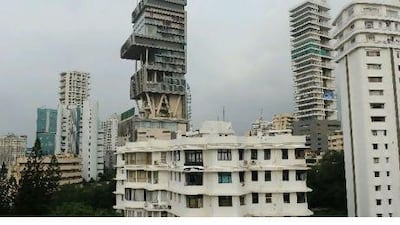NEW DELHI // Even in Mumbai, a city dominated by tall buildings, Antilia is hard to miss. A cantilevered steel-and-chocolate-brown confection with glittering windows, it looms 27 storeys above the tiny Altamont Road.
Antilia is also immediately recognisable for being India's most lavish personal residence, built by the industrialist Mukesh Ambani for his family of five, at a rumoured - and much-criticised - cost of Dh3.6 billion.
Antilia, which was finished last year, has always been controversial for its sheer ostentation in a city teeming with poverty. But it may now be in trouble of a different sort over a complaint that the land was acquired illegally from a charitable trust under an Islamic endowment.
The Maharashtra Wakf Board, which administers buildings and land held in Islamic endowments in the state, contends the trustees of an orphanage on the land did not have permission to sell the property to Mr Ambani in 2002.
ND Pathan, the board's chief executive officer, said the land's ownership, after the 1995 Wakf Act was passed, had been vested with the board rather than with the orphanage. Under law, a Wakf board is not allowed to sell or lease its land to private parties, Mr Pathan said, unless the circumstances were exceptional.
"We tried to recover the land under section 54 of the Wakf Act, which deals with wakf land that has been encroached upon," Mr Pathan said, adding that the board first raised the matter with the court when the land was bought in 2002.
"Ambani went to court and got a stay on that order. We tried to appeal the stay in the Supreme Court and didn't succeed, so our petition is now back pending in the high court."
The trustees of the Currimbhoy Ebrahim Khoja Orphanage, established in 1894, said in court that the land did not belong to the Wakf board.
Mr Pathan also denied a claim by Mr Ambani's lawyers that the board had waived its objection to the sale of the property in exchange for a payment of about Dh130,000.
"No such thing happened. A payment was made, but it was part of another legal process," he said.
On Monday, Maharashtra's minister for minority affairs, Naseem Khan, said the government may consider referring the matter to the Central Bureau of Investigation.
Mr Ambani, the chairman and managing director of Reliance Industries, is India's richest man, with a net worth estimated by Forbes magazine of about Dh100bn. He bought the property, of 4,532 square metres, for roughly Dh17m. Estimates of how much the land would have been worth on the open market had run between Dh51m and Dh294m.
Reliance Industries did not respond to requests for comment on the case.
The details of Antilia, completed in three years, made for sensational media coverage late last year, as its owner moved into his new home.
The home has six parking decks, enough for 168 cars. It has three helipads, nine elevators, a spa, a ballroom, four floors of living space, an in-house car service centre, guest apartments, an elevated garden and a 50-seat cinema - all tended by several hundred servants.
In its first month of occupancy, the Mumbai Mirror tabloid reported last November that the residence recorded an electricity bill of nearly Dh573,000.
Antilia has drawn fire for its much-publicised opulence, standing as it does in the midst of a city of poor people. Even the normally reserved Ratan Tata, another leading Indian industrialist in Mumbai, had criticised the building for its grandiosity.
"It makes me wonder why someone would do that. That's what revolutions are made of," Mr Tata was quoted as saying by The Times newspaper in London in May. "The person who lives in there should be concerned about what he sees around him and [should ask] can he make a difference. If he is not, then it's sad because this country needs people to allocate some of their enormous wealth to finding ways of mitigating the hardship that people have."
Maulana Ather Ali, a scholar associated with Mumbai's Minara Masjid, said the terms of sale have been perhaps the most significant spark of contention.
"I think, in the Mukesh Ambani case, a lot of this rancour has to do with the fact that he bought it at a price far less than what it was worth," Mr Ather Ali said.
"But even though this is a special case, it is indicative of a growing trend," Mr Ather Ali said. "All across India, wakf land is being encroached upon. It's a problem everywhere, and very little is being done to stop it."

